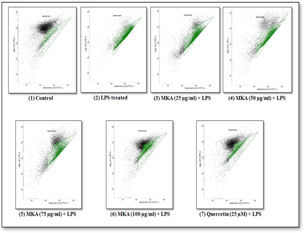Abstract
The Polyherbal formulations are used as a potential target for treating various diseases due to its wide array of phytoconstituents with antioxidant potential. In the present study, the therapeutic effect of Polyherbal formulation (MKA) comprising of three plants Mimusops elengi L., Kedrostis foetidissima (Jacq.) Cogn. and Artemisia vulgaris L. were studied in LPS induced RAW 264.7 macrophages. Four different concentrations (25, 50, 75 and 100 µg/ml) of MKA were tested against control, LPS treatment and standard Quercetin in LPS induced RAW 264.7 macrophage cells. The rate of Lipid peroxidation was measured in terms of Malondialdehyde (MDA) levels. The cytosolic LDH leakage was determined by measuring NADH release at 340nm. The changes in mitochondrial membrane potential were studied by measuring red/green fluorescent intensity of JC-1 stained cells in the flow cytometer. It was found that MKA treatments significantly reduced the rate of Lipid peroxidation and LDH leakage compared to LPS treatment. The results of flow cytometry revealed that the JC-1 green fluorescent intensity decreased with increase in MKA concentration, in a dose-dependent manner. It is evident from the study results that, the MKA has a therapeutic effect on LPS induced RAW 264.7 macrophages by protecting the cells from lipid peroxidation, restoring the cell membrane integrity and mitochondrial membrane potential.
Full text article
Authors

This work is licensed under a Creative Commons Attribution-NonCommercial-NoDerivatives 4.0 International License.

